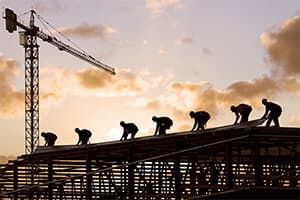Roofer Injuries
 Experienced Miami Work Injury Lawyers Protecting Those Who Risk Their Safety to Keep Our Homes and Businesses Safe
Experienced Miami Work Injury Lawyers Protecting Those Who Risk Their Safety to Keep Our Homes and Businesses Safe Roofers perform some of the most challenging and dangerous work in the construction industry. With inherent risks from heights, weather, and equipment, roofer injuries are unfortunately common. When accidents happen, roofers may face a lengthy recovery time, mounting medical bills, and lost income. At Friedman Rodman Frank & Estrada, our knowledgeable Miami workers’ compensation lawyers have over 45 years of experience helping injured workers obtain the medical and compensation benefits they need to get their lives back on track.
Common Dangers Most Roofers FaceRoofers face numerous dangers each day on the job, many of which are heightened by the nature of working at elevated heights. One of the most obvious risks is falling, which remains the leading cause of injury among roofers. Working high above the ground often involves scaffolding, ladders, and unsteady surfaces that can shift or give way. Even with proper harnesses and other safety gear, a single misstep can lead to serious injuries or even fatalities.
Additionally, roofers are exposed to the elements. Intense heat, high winds, or unexpected rain can all create hazardous conditions that make surfaces slippery or cause roofers to lose balance. In Florida, especially, roofers are at increased risk of heat-related illnesses, such as heat stroke and dehydration, as they often work under direct sunlight with minimal shade. Another danger roofers face is exposure to harmful materials, such as asbestos or harsh chemicals, which can pose long-term health risks. Handling heavy materials and tools can also lead to musculoskeletal injuries, especially to the back, shoulders, and knees. These hazards make roofing one of the riskiest trades, requiring careful advance planning and effective safety protocols to reduce injury rates.
Types of Roofer AccidentsSome of the most common roofer accidents include falls, slips, and injuries from falling objects. Falls are among the most devastating accidents, often resulting in broken bones, traumatic brain injuries, or even spinal cord injuries. A fall from even a modest height can cause significant trauma, while falls from greater heights may be life-threatening. These injuries often require extended recovery periods and may leave the roofer unable to work for months and oftentimes years.
Slips and Trips are also frequent among roofers, especially when surfaces are wet or when tools and materials are not properly secured. Slipping on loose shingles, stray nails, or roofing materials can cause fractures, sprains, or head injuries. In some cases, slips can lead to falls off the edge of the roof, compounding the severity of the injury.
Falling Objects also present a constant hazard. Tools, shingles, and other roofing materials can fall from significant heights, striking workers below. A nail gun, hammer, or piece of roofing material falling onto a worker can result in concussions, broken bones, or worse. Wearing hard hats can reduce some of the risk but falling object injuries still pose serious threats.
Finally, Heat-Related Illnesses are common in Florida’s climate. Heat stroke, dehydration, and heat exhaustion can occur quickly, especially in summer. These illnesses can cause dizziness, fatigue, and confusion, increasing the likelihood of other accidents.
Workers' Compensation Versus a Personal Injury ClaimIn Florida, roofers who are injured on the job are generally eligible for workers' compensation benefits, regardless of fault. Workers' compensation provides benefits for medical treatment, a portion of lost wages, and rehabilitation services to help injured roofers return to work. Workers' compensation is often the first recourse for injured roofers because it’s designed to provide benefits quickly and does not require proof of fault. However, workers' compensation may not cover all lost wages or provide compensation for pain and suffering.
If a roofer’s injury was caused by the negligence of a third party, such as a contractor, property owner, or equipment manufacturer, there may also be grounds to file a personal injury claim. Unlike workers' compensation, a personal injury claim can provide additional compensation for damages like pain and suffering and full lost wages.
For example, if faulty scaffolding supplied by a third party caused a fall, the injured roofer might also pursue a personal injury claim against that company. This type of claim could potentially result in a higher compensation amount but requires evidence of fault of the third party. Consulting an attorney experienced in both workers' compensation and personal injury cases, like the attorneys in our firm, can help roofers explore all options and pursue the compensation they need.
Discuss Your Claim With an Experienced Miami Workers' Compensation LawyerIf you’re a roofer who was injured on the job, it’s essential to understand your rights and the full range of options available to you. Navigating Florida’s workers' compensation system can be challenging, particularly when dealing with complex injury cases that may also involve third-party negligence. At Friedman Rodman Frank & Estrada, our Miami workers’ compensation lawyers have extensive experience handling both workers' compensation and personal injury claims for injured roofers and other construction professionals. We understand the unique risks and challenges that roofers face and are here to guide you through the process with a focus on securing the maximum compensation you need on account of your injury. Whether your injury occurred from a fall, a falling object, or another type of accident, we’re here to help. To learn more and schedule your free consultation, call us at 305-448-8585 or connect with our staff by completing our secure online contact form. We do not get paid unless and until there is a successful resolution of your case.
 Friedman Rodman Frank & Estrada, P.A. Home
Friedman Rodman Frank & Estrada, P.A. Home




